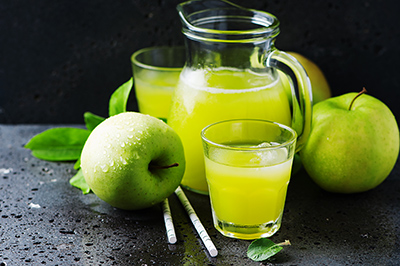Contents
There are many medicinal apple health benefits, but before we get into them, let’s learn more about this fantastic fruit. Every year the world grows more than forty million metric tons of apples, in 4th place after grapes, oranges, and bananas. Although not the most widely cultivated fruit, the apple is considered the “queen of fruits.” This may be because, besides its enormous culinary and medicinal virtues, it combines with practically all other foods.

Apple Nutritional Facts
Aside from the 12.6 percent carbohydrates in the form of sugars, no other nutrient stands out in the apple’s composition. The sugars are primarily fructose (fruit sugar, also called levulose) and lower proportions of glucose and saccharose. It contains minimal amounts of proteins and fats. Its vitamins are C and E, and its minerals include potassium and iron, although in limited quantities. Its nutrients provide 59 calories per 100 grams (59 kcal/100 grams).
Given this rather ordinary nutritional composition, it is hard to imagine the extraordinary dietary and therapeutic properties that make the apple genuinely medicinal. Although the apple’s composition (carbohydrates, proteins, fats, vitamins, and minerals) does not justify its therapeutic effects, its non-nutritive components do. These are the numerous substances found in plant-based foods that do not provide energy and whose function was unknown until a few decades ago.
Nutrition science has been making tremendous advances in recent years, discovering the effects of many of these substances considered “an accompaniment” in fruits and vegetables; for example, more than 170 phytochemicals have been found in the orange. The function of most of them is still unknown. The same is true of the apple, although it has not been the subject of as much investigation as the orange.
Today, the existence and function of some of the apple’s non-nutritive components are known, although many more are yet to be discovered:
PECTIN: This hydrocarbon is not absorbed in the intestine and forms most of the insoluble vegetable fiber. Pectin is most of the apple’s 2.4 grams/100 grams of fiber. Only one-fifth of the fruit’s pectin is in the peel. Therefore, when it is removed, only a small portion is lost. Pectin retains water and various waste products in the intestine, acting as an intestinal “broom” that facilitates the elimination of toxins in the feces.
ORGANIC ACIDS: These represent one percent to 1.5 percent of the apple’s weight, depending on the variety. Malic acid is most prevalent, although citric, succinic, lactic, and salicylic acids are also present. As with citrus fruits, when these organic acids are metabolized, they produce an alkalizing (antacid) effect in the blood and tissues. These acids also renew the intestinal flora and prevent intestinal fermentation.
TANNINS: The apple is, after the quince, one of the fruits richest in tannins, astringent and anti-inflammatory.
FLAVONOIDS: These constitute a group of phytochemicals in many plant-based foods capable of preventing the oxidation of low-density lipoproteins (substances that carry cholesterol in the blood). In this way, flavonoids keep cholesterol from depositing on arterial walls and stop the progress of arteriosclerosis (hardening and narrowing of the arteries). Apples contain a variety of flavonoids, the most active and essential of which is quercetin because of its antioxidant effect. Apples, together with onions, are the richest plant-based foods in quercetin.
BORON: This little-known mineral plays various roles within the body currently being studied. One of these seems to facilitate the assimilation of calcium and magnesium, meaning that boron may contribute to the prevention of osteoporosis. Apples are amongst the fruits richest in boron. These substances partially explain apple health benefits: anti-diarrheic, laxative, diuretic, depurant, hypolipidemic (reduces blood lipid levels), choleretic, nerve tonic, alkalizer, and antioxidant. Because of this, eating them daily benefits both those who are healthy and the ill, particularly in the following cases:
Apple Health Benefits
DIARRHEA and COLITIS: Apples’ pectin acts as a sponge, attracting and eliminating the toxins generated by the bacteria that cause colitis and gastroenteritis. Additionally, the fruit’s tannins dry the intestinal mucosa and decrease inflammation. The organic acids, as antiseptics, repair the normal bacterial flora in the intestine. A diet based solely on apples is helpful in any diarrhea. When the digestive organs are impacted, apples are best prepared baked, cooked, or as applesauce.

Apple health benefits (CONSTIPATION): Apples normalize intestinal function and correct constipation and diarrhea. Consuming 1 or 2 apples on an empty stomach in the morning helps alleviate intestinal hypotony, the most common cause of constipation.
Apple health benefits (CHRONIC SKIN ECZEMA): Caused by autointoxication due to constipation.
Apple health benefits (HIGH BLOOD PRESSURE): Studies conducted in Japan, where the typical diet comprises a lot of salt, have shown that those who frequently eat apples have lower blood pressure than the rest of the population. Apples contain virtually no sodium and are extremely rich in potassium, contributing to their hypertensive effect.
Apple health benefits (HIGH CHOLESTEROL): Eating two or three apples daily for several months has reduced cholesterol levels. A partial explanation for this effect is that the pectin absorbs the biliary salts in the intestine, one of the essential ingredients from which the body makes cholesterol.
Apple health benefits (ARTERIOSCLEROSIS): Because of their richness in flavonoids, particularly quercetin, apples help prevent cholesterol deposits within the arteries and their subsequent narrowing. Flavonoids also inhibit platelet stickiness (the tendency of the platelets in the blood to form thromboses or clots). Eating apples regularly prevents coronary artery narrowing, leading to a heart attack.

Apple health benefits (GALLSTONES): Studies performed at the University of Toulouse with laboratory animals show that apples have an effect that increases bile production in the liver, which decongests the liver. It also lowers the lithogenic index of the bile, which measures the tendency to form biliary calculi. It is reasonable to recommend apples to patients at high risk of gallstones (particularly women between 40 and 50 years old with more than two children) or those who have undergone surgery. Apples make the bile more fluid and prevent calculi formation, although they do not affect those already formed.
Apple health benefits (DIABETES): Diabetics tolerate apples very well:
- A significant amount of their sugar is fructose, which requires less insulin than glucose to be metabolized and produce energy
- Second, pectin regulates the release of sugars, allowing them into the bloodstream slowly and progressively.
Apple health benefits (COLON CANCER): Studies in Japan using laboratory animals show that apple pectin can prevent the growth of cancerous colon tumors. This preventative action supports recommending abundant apple consumption to patients at high risk for colon cancer and those diagnosed and/or treated to avoid its relapse.
Apples are the quintessential fruit. They are well tolerated by everyone and combine well with any other food.
Apple Treatment for Specific Conditions
Medical conditions can significantly improve with apple treatment. This treatment involves eating two kilos (4.4 pounds) of apples daily for three to five consecutive days. You are allowed to drink water. The apples may be eaten raw, as applesauce, baked, or cooked without additional sweeteners. This treatment may be repeated several times a year.
HIGH BLOOD PRESSURE: Apples facilitate the elimination of the sodium ions that cause the arteries to contract and increase blood volume and fluid retention in the tissues. They also replace the sodium ions with those of potassium, which normalizes blood pressure and improves cardiac function.
CHRONIC ECZEMA CAUSED by AUTOINTOXICATION: Apples absorb intestinal toxins, thus facilitating blood and skin purification. Apples also help blood and skin. Apples also help relieve constipation and promote the cleansing of the liver, whose congestion results in many skin disorders.
EXCESS URIC ACID: An apple treatment alkalizes the blood and facilitates the elimination of uric acid through the urine.
GASTROINTESTINAL and COLITIS-RELATED DIARRHEA: Apple fiber (pectin) is an excellent absorbent that cleanses the intestine. It also restores the physiological bacterial flora acting with the organic acids in apples.
LIVER DISEASE: Apples decongest the hepatic gland thanks to their choleretic and depurant effects. They are highly recommended in cases of chronic hepatitis, fatty liver degeneration due to alcoholic beverage consumption, and cirrhosis.
HIGH CHOLESTEROL and ARTERIOSCLEROSIS: Apples reduce blood cholesterol and prevent arteriosclerosis.

COLON CANCER: Apples help avoid the cancerous degeneration of the colon.
Apple Juice for Diarrhea
There have been cases of diarrhea, particularly in children, because of drinking commercially bottled apple juice. Curiously, this only happens with bottled clear, transparent juice and not with natural juice that is cloudy in appearance. Investigations conducted in the Netherlands have shown that specific non-absorbable mono and oligosaccharides are produced during the industrial process used to clarify the juice.
These carbohydrates, along with an excess of fructose concerning glucose and the presence of sorbitol, explain diarrhea resulting from drinking industrial apple juice.
Apple Scientific Facts
- Scientific name: Pirus malus L.
- French: Pomme.
- Spanish: Manzana.
- German: Apfel.
- Description: Fruit of the apple tree of the botanical family Rosaceae.
- Environment: Apples are grown in temperate regions around the world. They do not grow in the tropics since the fruit requires some cold weather.
How to Use and Prepare Apple
- RAW: Peeling is recommended because, despite what many believe, the small amount of pectin and vitamins in the peel does not justify eating it. The peel can contain pesticides, and it isn’t easy to digest.
- APPLESAUCE: A glass grater is best because it is an inert material. However, modern stainless steel is adequate. Applesauce is recommended for children, the elderly, and those weakened by illness.
- BAKED: This is a delicious and highly digestible way to eat apples.
- COOKED: Apples prepared this way should be eaten with the cooking liquid. These are easy to digest and appropriate for children.
- JUICE: Natural, unprocessed juice is preferable to that prepared industrially.
DISCLAIMER: All content on this website is presented solely for educational and informational objectives. Do not rely on the information provided as a replacement for advice, diagnosis, or treatment from a qualified medical expert. If you are pregnant, nursing, or have any preexisting medical concerns, talk to your doctor before using any herbal or natural medicines.
REFERENCES
- George D. Pamplona-Roger, M.D. “Encyclopedia of Foods and Their Healing Power.” George D. Pamplona-Roger, M.D. Encyclopedia of Foods and Their Healing Power. Trans. Annette Melgosa. Vol. 2. Chai Wan: Editorial Safeliz, 2005. 229, 230, 231, 232. Print. [Apple health benefits]
- Bohn, S. K., et al. (2015). Apple Polyphenols and Their Potential Role in Cancer Prevention. Critical Reviews in Food Science and Nutrition, 55(8), 1081-1096.
- Guo, J., et al. (2014). Apple Polyphenols Attenuate Inflammatory Responses in LPS-Stimulated RAW 264.7 Macrophages. Nutrients, 6(5), 1890-1905.
- Bazzano, L. A., et al. (2008). Fruit Consumption and Risk of Diabetes Mellitus: Results from Two Prospective Cohort Studies of US Men and Women. Diabetes Care, 31(7), 1393-1397.
- Slavin, J. (2013). Fiber and Prebiotics: Mechanisms and Health Benefits. Nutrients, 5(4), 1417-1435. https://doi.org/10.3390/nu5041417
